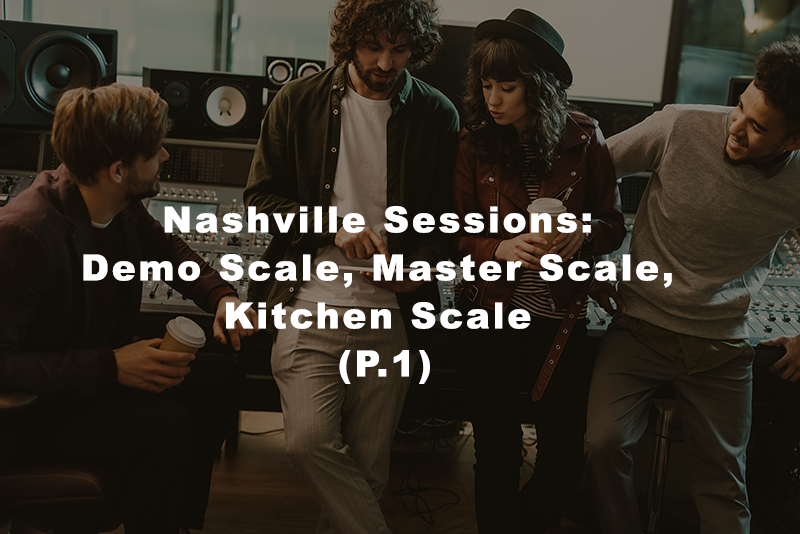Nashville Sessions: Demo Scale, Master Scale, Kitchen Scale (P1)
“When I hear someone talking about a 10 and a 2, I’m thinking October and February.”
These are joking words of a Nashville road musician, referencing the life of Nashville recording musicians and illustrating that the latter live in a world which only they fully understand.
Fifteen years ago or more, when I first moved to Nashville from Russia to pursue a career in music, it didn’t take me long to discover that Nashville recording scene revolved to a large degree around 5 distinct things:
1. Excellence. (You know I had to go there!)
2. Nashville Musicians Association, Local 257 of AFM (American Federation of Musicians). Every serious session musician considers joining at one point or another.
3. Nashville number system charts.
4. Recording sessions: usually a 10 o’clock and a 2 o’clock. 6 o’clock not as common.
5. Demo scale, limited pressing scale, master scale, as per AFM 257 (see #2).
I am oversimplifying of course, but hey it’s my article.
So, let’s see. Number system charts I’ve already covered extensively. Excellence is a subject that I’ll never stop covering – and striving for. What’s all that about 10 or 2 o’clock sessions and various scales?
Session times are relatively simple to explain. As far as the Union sessions go, there are usually 3 on any given day: morning session at 10am, afternoon session at 2pm and evening session at 6pm. 3 hours allotted for each, with a 1-hour break for lunch or dinner in between. Hey, musicians gotta eat, too! There are also “premium sessions”, recorded between midnight and 8am, and “double time” sessions, recorded during national holidays, but I never ran into those myself.
Keep in mind, the session’s starting time is the “downbeat” time, when tape starts rolling and music starts being recorded. [Figurative tape not literal, most of the time anyway.] So you gotta show up early enough in advance to set up all your gear, get recording levels, get your cup of coffee, get your hellos and catching up out of the way, etc. Your arrival time depends on the size of your setup: drummers usually show up first, while fiddle players can just waltz in 10-15 minutes before downbeat. I should have learned to play a fiddle. Sigh.
Now, what about scale rates? That’s where it gets more complicated. Let’s look at them, one by one.
Demo scale. Most often used by song publishers or songwriters to produce “demonstration” recordings of their compositions: to pitch to artists and labels. You can usually get away with tracking as many as 5 or even 6 songs on one demo session. This pretty much only leaves 30-36 minutes per song, give or take. (As a general rule, vocals are not recorded during a tracking session, unless it’s a scratch vocal only.) So you really need to make sure that your charts are prepared in advance and that there is a producer – or a session leader – who can quickly relay to the rest of the musicians the game plan for each song. If you can manage to record 6 songs on one session? You got yourself a good deal. There is only one caveat: the “demo” restriction. You can’t turn around and sell these recordings on iTunes, or press physical CDs. You can’t submit them to TV or film or other media. It can’t directly generate revenue. It is for “demonstration” purposes only. I know how you feel.
Limited pressing scale. A bit more costly but also less restrictive. Meant for recordings where “the aggregate number of units, physical and digital manufactured and/or sold of a particular recording does not exceed ten-thousand (10,000) and where the music that is recorded will not be utilized for any other purpose whatsoever other than for sale to the public as a sound recording.” So, a good way to go for indie artists and labels, or for songwriters who want to produce nice-sounding professional demos which can also be sold at their live shows.
Then comes low budget scale. Self-explanatory. These sessions must be approved in advance and pass certain guidelines and limits, for the low budget scale to apply.
Finally, top tier of the session cake: master scale. Minimum restrictions on the use of recordings, maximum cost. You can usually get about 3 songs tracked on one master session, or you can take your time and record only 1 or 2.
These are the basics of recording music in Nashville that I discovered over a decade ago. How did they translate for me into today’s recording reality, as I find myself focusing more and more on remote online recording – for clients whom, most of the time, I don’t get to meet face-to-face? Read part 2 to find out.

